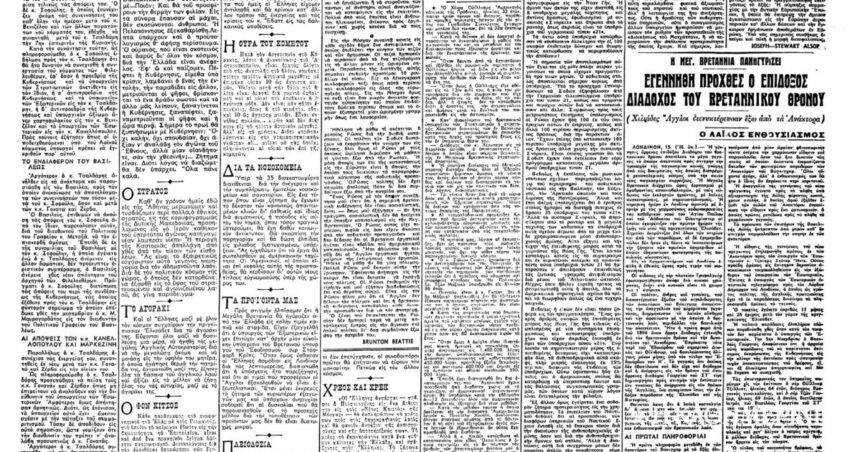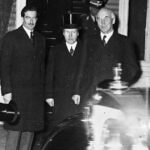The evening of November 14, 1948, finds England in the midst of celebrations, as the first child of Princess Elizabeth of England and Prince Philip, Charles, now Charles III of England, is born.
“The birth of a male heir to the British throne was the great event which momentarily distracted the attention of the world public opinion from the trials that the post-war world is going through under the shadow of a new world conflict”, reports “Kathimerini” in the page of the 16 November, sketching the picture of Cold War reality: a few months earlier the Soviet blockade of Berlin had begun.
“Great Britain is going through a time of celebration with uniform cannon fire, with church bells ringing, with popular gatherings, with flag decorations. Today in London was like a holiday with the joyous bell-ringing of St.’s Cathedral and Westminster Abbey, which greeted the first day of the life of Princess Elizabeth’s son. Flags fluttered on all the buildings and from the windows, and the newsagents were not in a position to satisfy the demand for the morning papers which published a photograph of the royal family. At the London Stock Exchange, the national anthem was sung in honor of the newborn. The jets in Trafalgar Square were lit up in blue tonight because “blue is the color for boys”. The citizens, men and women, who spent the night outside the railings of Buckingham Palace awaiting the announcement of the happy event, interpreted the popular sentiment and devotion with which the British people surround their royal family.”
The joyous event was of particular importance to the British, as it coincided with Remembrance Sunday for the sacrifice of British soldiers in the two World Wars, while a few days earlier the celebration of Armistice Day, i.e. the end of A World War II (Armistice Day or Remembrance Day). But there was another reason:
“It was the first time since 1894 that a male heir had been born to the British throne and the Hanoverian dynasty. It was then about Edward, the current Duke of Windsor, who reigned for only a few months under the title of Edward VIII. The fact that he did not reign and had no heir and the ascension to the throne of the maleless George VI had created for the moment the impression that women would ascend the throne of England, perhaps to continue the glorious tradition of Elizabeth and of Victoria. It seems, however, that the popular nostalgia for the male British King interfered with the popular feeling of the glorious historical memories. And the joyous event of Sunday night filled the British people with enthusiasm”, commented “K”.
The birth of Charles, however, was characterized by another originality. “The old tradition of entire centuries was violated yesterday when the minister of the interior was not present during the delivery. On the 5th of November, King George decided that this ancient tradition of being an official representative of the Government at the bedside to prevent any substitution of the infant, is completely antiquated and should not be continued”.
However, the name of the newborn prince was kept secret, until it was announced at his baptism, on December 15 of the same year: Charles Philip Arthur George, Prince of Edinburgh.
Column editor: Myrto Katsigera, Vassilis Minakakis, Antigoni-Despina Poimenidou, Athanasios Syroplakis








